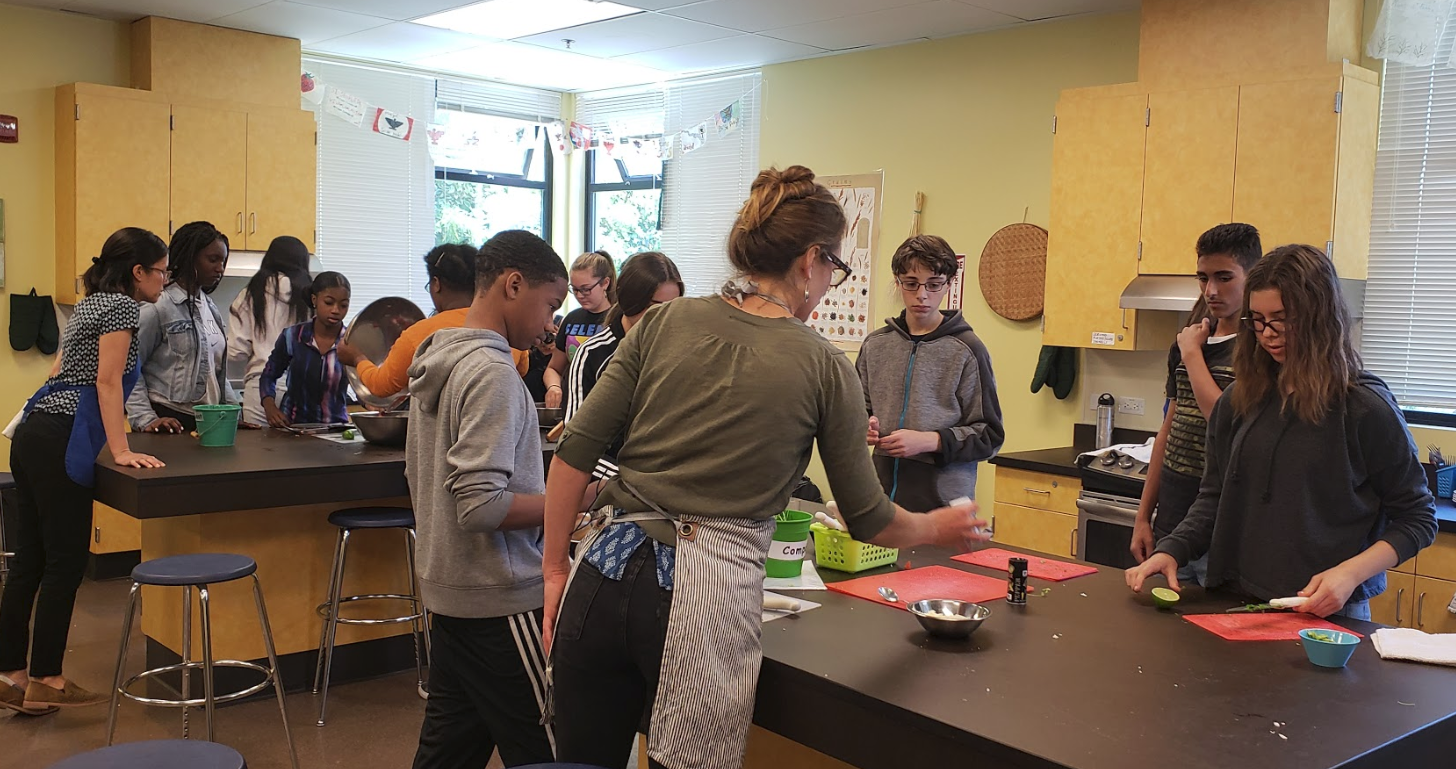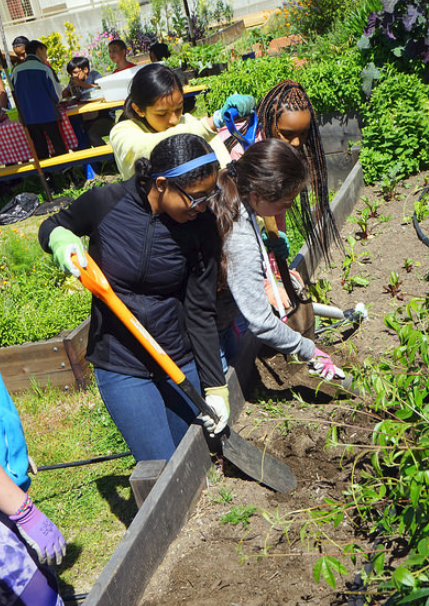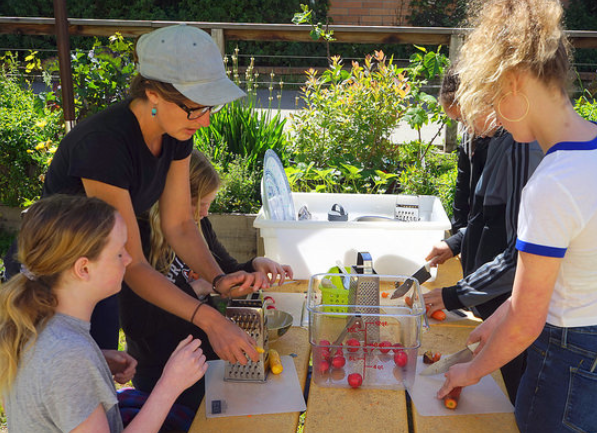 August 22, 2018
August 22, 2018
By Athena Roesler
Athena Roesler received her MPH in 2018 from the UC Berkeley School of Public Health.
Photos by Berkeley Unified School District.
Sugar-sweetened beverages (SSBs), which have zero nutritional value, haunt parents, educators, social justice activists, and public health professionals alike. With new sources of funding from Bay Area SSB taxes, Berkeley Unified School District (BUSD) and San Francisco Unified School District (SFUSD) are working to creatively promote child health. BUSD and SFUSD are uniquely positioned to serve as national innovators in the use of SSB tax revenue. School districts are able to leverage their scale and role as educators to teach healthy habits, provide nourishing food and beverages, and help reverse health inequities.
Growing evidence shows SSB’s dramatic impact on diet-related chronic disease and health disparities, especially among youth. Though there are many contributing factors, SSBs—such as sodas, sport drinks, and fruit-flavored drinks—are one of few items on our grocery shelves with a direct link to obesity. Consumption is also a risk factor for type 2 diabetes, heart disease, and dental decay.1,2,3 SSB intake is higher among adolescents, Black/African-Americans, Hispanic/Latinos, and low-income families in the U.S., worsening the health impacts among these four sometimes overlapping groups.4 In an effort to combat these health risks and inequities, Berkeley became the first municipality to pass a SSB tax in 2014. This levied a 1-cent per ounce excise tax on SSB distributors; consumers do not directly pay a tax. The city of San Francisco followed in 2016 with a nearly identical tax. Berkeley Food Institute Faculty Director Dr. Kristine Madsen and her research team have amassed consistent evidence on the effect of these taxes with recent data showing a 45% decline in consumption in low-income neighborhoods over the tax’s first 3 years.
Such impact alone should be enough to bolster the momentum for expanding SSB taxes. But the taxes have an additional benefit beyond their immediate health impacts: a steady stream of public health interventions are being funded with the wave of SSB taxes currently implemented in seven cities nationally. Since Berkeley’s tax implementation, $5 million has been raised and the San Francisco Controller’s Office estimates the SSB tax will generate $7.5 million in revenue for this fiscal year alone. In both cities, the school districts are the primary recipients of these funds. In Berkeley’s case, the school district committed to maximizing the impact of this new revenue by pledging to match SSB tax funding.

Berkeley Unified students learn about healthy eating while cooking a meal together.
In order to create sustaining behavioral change, both districts focus on expanding nutrition knowledge and helping students understand their health holistically. BUSD has received three Healthy Berkeley Grants from the tax revenue, totaling over $2.1 million, to help fund the Gardening and Cooking Program,5 which features bi-monthly, standards-based, garden education for every student. BUSD has also revamped their Health and Wellness Curriculum, designed to increase general nutrition and cooking knowledge. It focuses on the health impacts of sugar-sweetened drinks and food while encouraging reduced consumption of sugar.6 In a favorite student activity, “Count It Up,” students read nutrition labels and then convert each the grams of sugar into teaspoon equivalents in order to better visualize the sometimes shocking amounts on sugar in SSBs. Students learn to test their sweetness threshold, tasting drinks with varying levels of naturally occurring sugars. BUSD also holds bi-yearly family events at each school where students show off their new knowledge and cook a healthy meal as a community. At the high-school level, youth participatory action projects (YPAR) at Berkeley Technical Academy and the Career Technical Education program (CTE) at Berkeley High School are further preparing the next generation of public health leaders. CTE connects student to food systems internships in collaboration with various community partners.

Middle school students dig in, prepping soil for the next season’s crops.
SFUSD is currently in the process of developing specific expenditure plans for SSB funds and developing strategies for plan implementation and monitoring throughout the year. With the approximately $3.2 million SFUSD will receive this year, programming will focus on decreasing consumption of SSBs while increasing water consumption and healthy food access, improving oral health, and promoting physical activity.7 In 2015, SFUSD established a trailblazing wellness policy, and this upcoming funding will help put the policy into action. The bulk of funding from the tax will go to improving school food and installing hydration stations in all schools. SFUSD will have a unique approach to foster student engagement and leadership by giving students a voice in decision-making. A student school food advisory board suggests healthy menus that youth actually want. Student leaders will also receive a stipend for conducting peer-to-peer nutrition education and project-based learning. To counter-balance SSB advertisements that target youth, communities of color, and low-income communities, students will create and lead marketing campaigns around health and nutrition. Instead of adults deciding what messaging youth should pay attention to, students will craft what resonates with their peers and community.

Students learn knife and grating techniques with rainbow carrots in a Berkeley garden classroom.
Both BUSD and SFUSD are using SSB tax money to create a new wave of student health and wellness champions. By adding a peer voice component and using this generation’s strength and immersion in social campaigns, this novel source of funding transforms into much needed prevention methods. Additional collaborations with community groups will also help to make these programs stronger. Other cities and states may follow the Bay Area’s innovative lead in using sugary-sweetened beverage tax dollars to promote health and nutrition in schools and far beyond.
Are you a UC Berkeley student interested in getting involved in BUSD’s Gardening and Cooking Program? Apply for the Fall 2018 Urban Agriculture and Education Internship for academic credit! More details here. Applications due September 1, 2018.
Sources
- Hu, F. B. (2013). Resolved: there is sufficient scientific evidence that decreasing sugar-sweetened beverage consumption will reduce the prevalence of obesity and obesity-related diseases. Obes Rev, 14(8), 606-619. doi:10.1111/obr.12040
- Hu, F. B., & Malik, V. S. (2010). Sugar-sweetened beverages and risk of obesity and type 2 diabetes: epidemiologic evidence. Physiol Behav, 100(1), 47-54. doi:10.1016/j.physbeh.2010.01.036
- Malik, V. S., Pan, A., Willett, W. C., & Hu, F. B. (2013). Sugar-sweetened beverages and weight gain in children and adults: a systematic review and meta-analysis. Am J Clin Nutr, 98(4), 1084-1102. doi:10.3945/ajcn.113.058362
- Ogden, C. L., Carroll, M. D., Kit, B. K., & Flegal, K. M. (2014). Prevalence of childhood and adult obesity in the United States, 2011-2012. Jama, 311(8), 806-814. doi:10.1001/jama.2014.732
- City of Berkeley. (2018). Healthy Berkeley Funded Organizations FY2018 and FY2019. Retrieved from http://www.healthyberkeley.com/funded-organizations-fy2018-and-fy2019
- Berkeley Unified School District. (2018). “Gardening And Cooking Program Annual Report 2017-2018.” https://www.berkeleyschools.net/wp-content/uploads/2018/07/GARDENING-AND-COOKING-PROGRAM-ANNUAL-REPORT-2017-18.pdf
- San Francisco Unified School District. (2018, March 1). Sugary Drink Distributor Tax: Request for Funding. file:///Users/athenarroesler/Downloads/Sugary%20Drinks%20Distributor%20Tax%20SUFSD%20Request%20(4).pdf